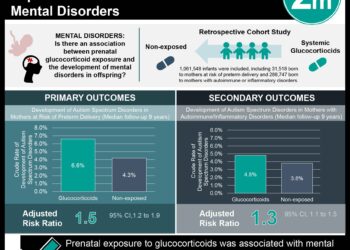Prolonged use of opioids and benzodiazepines in extremely preterm infants associated with adverse effects on neurodevelopmental outcomes
1. In this cohort study, prolonged use of opioids and benzodiazepines among extremely preterm infants was associated with lower cognitive, motor and language scores at 2 years’ corrected age as assessed using the Bayley Scales of Infant Development.
2. The results of this study suggest that it is at the discretion of the medical team to balance the potential direct and indirect adverse effects of opioids and benzodiazepines on neurodevelopment with the clear adverse effects of untreated pain, agitation, and discomfort on the developing brain in extremely preterm infants.
Evidence Rating Level: 2 (Good)
Study Rundown: The use of opioids and/or benzodiazepines in extremely preterm (EP) infants for the mitigation of pain, agitation, and discomfort through illness has been associated with risks of neurodevelopmental impairment. However, the role of these analgesic and/or sedative medications as well as the long-term neurodevelopmental implications of prolonged therapy with opioids, benzodiazepines, and/or a combination of the drugs in EP infants are poorly understood. Given the lack of data regarding the outcomes of these infants, this cohort study used data from a large multicenter trial, the Preterm Erythropoietin Neuroprotection (PENUT) trial, to describe the use of opioids and benzodiazepines in EP infants during neonatal intensive care unit (NICU) hospitalization and to characterize their association with 2-year neurodevelopmental outcomes. The main outcomes and measures of the analysis were cognitive, language, and motor development scores assessed via the Bayley Scales of Infant Development (BSID-III). From 936 infants born between gestational ages of 24 weeks, 0 days, and 27 weeks, 6 days, individuals exposed to both opioids and benzodiazepines for longer than 7 days were at increased risk for in-hospital morbidities, prolonged length of hospitalization, and lower BSID-III cognitive, motor, and language scores at 2 years’ corrected age compared to infants without exposure or those exposed to a single agent. Thus, it is at the discretion of the medical team to balance the known direct and indirect adverse effects of these drugs on neurodevelopment with the clear adverse effects of untreated pain, agitation, and discomfort on the developing brain. As pharmacological and non-pharmacological interventions improve in efficacy in the future and more EP infants survive beyond the neonatal period, further long-term studies are needed to stratify the risks and benefits of prolonged opioid and benzodiazepine therapy with painful procedures in this population. A limitation of this study was the lack of data on specific dosing as investigators could not differentiate between a single daily dose vs a continuous infusion as well as whether the drugs of interest were administered in combination or series. This lack of data on dosing, duration, and metabolism could lead to residual confounding of various adverse effects of the drugs of interest and misclassifications in the overall study outcome.
Click to read the study in JAMA
In-Depth [retrospective cohort]: This cohort study was a secondary analysis of data from the PENUT trial conducted across 19 centers in the United States, which included 936 infants born at gestational ages between 24 weeks, 0 days, and 27 weeks, 6 days (448 [48%] female; 611 [65%] White infants; mean [SD] gestational age, 181 [8] days). Data was collected from December 2013 to September 2016 with data analysis completed by December 2020. Exposure to opioids and/or benzodiazepines in the NICU was classified as short-term (i.e., 7 days) or prolonged (i.e., >7 days). From 936 infants included in the study, 692 (74%) had neurodevelopmental outcome data available, 158 (17%) were not exposed to any drugs of interest, 297 (32%) received either opioids or benzodiazepines, and 481 (51%) received both. Infants exposed to both opioids and benzodiazepines had adjusted odds ratios of 9.7 (95%CI, 2.9-32.2) for necrotizing enterocolitis and 1.7 (95%CI, 1.1-2.7) for severe bronchopulmonary dysplasia. Furthermore, these patients recorded a longer estimated adjusted mean difference in length of hospitalization at 34.2 (95%CI, 26.2 to 42.2) days compared to patients who received neither drug. After adjusting for multicenter variations and propensity scores, individuals exposed to opioids and benzodiazepines had lower BSID-III cognitive, motor, and language scores at 2 years’ corrected age compared to infants without exposure or those exposed to a single agent (estimated difference in mean scores on cognitive scale: -5.72; 95%CI, -8.88 to -2.57). Prolonged exposure to morphine, fentanyl, midazolam, or lorazepam was also associated with lower BSID-III scores compared to infants without exposure (median [IQR] motor score, 85 [73-97] vs 97 [91-107]). In comparison, short-term exposure to both opioids and benzodiazepines had no significant effect on BSID-III scores compared to infants without exposure.
Image: PD
©2021 2 Minute Medicine, Inc. All rights reserved. No works may be reproduced without expressed written consent from 2 Minute Medicine, Inc. Inquire about licensing here. No article should be construed as medical advice and is not intended as such by the authors or by 2 Minute Medicine, Inc.







